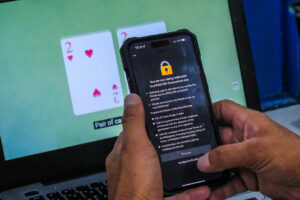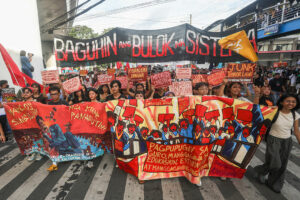
Wave of telco investments seen as Konektadong Pinoy IRR finally released

By Ashley Erika O. Jose, Reporter
THE Philippines expects a wave of investments in the telecommunications sector, as the government on Wednesday released the implementing rules and regulations (IRR) of its open access law.
Department of Information and Communications Technology (DICT) Secretary Henry Rhoel R. Aguda said that about six to seven foreign companies plan to enter the Philippine telecommunications sector once the IRR of the Konektadong Pinoy Act takes effect. He did not name the firms.
Mr. Aguda told reporters that two of these players are expected to come in sooner.
“These are reputable companies. Out of the seven, two of these will hit the ground running,” he said.
The government is still in talks with the foreign players, Mr. Aguda said, noting that these companies will provide a variety of services particularly mobile, fiber and satellite services.
“Most of them are fiber. They will have to go through their due diligence. It is easy to say that they are interested. The rubber meets the road when they start digging the fiber and building the tower,” Mr. Aguda said.
The Konektadong Pinoy Act, or the Open Access in Data Transmission Act, lapsed into law on Aug. 24, while the IRR was signed on Wednesday.
The law streamlines the licensing process for new entrants, boosting competition in data transmission.
“We need the type of telco industry that is vibrant. The IRR will be effective within 15 days after we publish it,” Mr. Aguda said.
Expanding connectivity from 30,000 to 100,000 cell sites and achieving full fiberization will require investments that are at least equal to previous benchmarks, Mr. Aguda said.
“A typical telco company invests around a billion US dollars to $1.5 billion annually when expanding its network,” Mr. Aguda told a Palace briefing in Filipino. “If they’ve been investing about one to $1.5 billion every year, I think that’s the minimum amount of investment that should come in,” he added.
Mr. Aguda said the IRR addresses the concerns of the telecommunications companies, particularly on the issue of cybersecurity and a level playing field.
The IRR provides transparency in pricing and the timely regular publication of updated pricing information to ensure fair trading within and between each data transmission.
Data transmission industry participants (DTIPs) will be allowed to construct, install, establish, maintain, lease or own, networks or facilities without the need of a legislative franchise, while also promoting asset sharing between current and new players.
The DICT, through its ICT Industry Development Bureau, will develop and issue guidelines outlining minimum cybersecurity standards and requirements, aligned with the DTIP’s risk profile for each data transmission segment
“The State shall promote data transmission infrastructure sharing and co-location to eliminate the uneconomic duplication of these facilities in the data transmission industry,” according to the IRR.
Mr. Aguda said the DICT will be the primary policy, planning and coordinating body of the government for the Konektadong Pinoy Act. It is tasked to formulate plans and policies to implement an open access mechanism in the industry.
The DICT will implement initiatives to encourage DTIPs to adopt and deploy new and next-generation technologies, prioritizing unserved or underserved areas, including educational institutions.
Incentives include income tax holidays, value-added tax exemptions, zero-rating from the date of registration, and duty exemption.
For Samuel V. Jacoba, founding president of the National Association of Data Protection Officers of the Philippines (NADPOP), the IRR addresses the concerns of telcos, particularly with the IRR remaining firm on requiring entrants to secure cybersecurity certifications after two years of operations.
“Within two years from registration or authorization, DTIPs shall secure a cybersecurity certification or cybersecurity compliance from the DICT Cybersecurity Bureau,” the IRR said.
Mr. Jacoba said two years will be enough time for new operators to establish baseline cybersecurity compliance anchored on global standards.
He noted incumbent telco operators should already have baseline cybersecurity compliance, so this requirement should not be an issue.
“Incumbent telco operators at this time should already have baseline cybersecurity compliance, so they need not look into this requirement as an issue,” Mr. Jacoba said.
Sought for comment, PLDT Inc. and Smart Communications, Inc. Chairman and Chief Executive Officer Manuel V. Pangilinan said: “It is probably not as bad as we expected, is my impression.”
However, Mr. Pangilinan declined to further comment on the Konektadong Pinoy, noting that he has not personally read it. He added that this will make PLDT evaluate and change its strategy.
LOWER PRICES?Mr. Aguda said the DICT, in partnership with the Australian government, has completed a real-time mapping of all fiber optic lines nationwide.
This will guide efforts to expand connectivity to 100% of households, supporting the government’s goal of providing every Filipino with fast, stable and reliable internet access.
Mr. Aguda also expects internet prices in the country to drop further and service quality to improve with the entry of new players.
While the IRR has yet to set out specific fees for new entrants, he said the DICT has already begun easing regulatory requirements to encourage participation.
For instance, the operating licenses of tower companies have been extended to 15 years from five years at no additional cost, he noted.
Mr. Aguda also noted that even before the IRR was released, existing telecommunications companies had already lowered rates.
“Right now, you can already get unlimited data for less than P500 — a substantial drop from last year,” he said.
The IRR would also further enhance competition, leading not only to lower prices but also to improved internet quality.
“What we want is not just cheaper service, but reliable service. With the same amount, you’ll get more data and better quality once the IRR is fully implemented,” Mr. Aguda said.
Incumbent telecommunications players are expected to expand and improve their services beyond urban centers with the expected entrants of more foreign players in the telco industry with the Konektadong Pinoy Act, Digital Pinoys said.
“We do anticipate increased investment in the connectivity sector as a result of the Konektadong Pinoy law. It provides predictability and policy direction — two major factors that investors look into before committing capital to infrastructure, particularly in underserved and far-flung areas,” Ronald B. Gustilo, a national campaigner for the Digital Pinoys said via Viber.
Konektadong Pinoy will drive growth because it will expand the market base, he said, adding that when more Filipinos gain reliable access to the internet, the demand for digital service such as e-commerce and financial technology rises.
“For telcos already operating, they will have to see the law as both a challenge and an opportunity. It will push them to move beyond the urban centers and improve their service quality, while also opening doors for public-private partnerships, shared infrastructure, and alternative connectivity models, he said,
Despite being a national priority since 2022, the Philippines’ digital transformation has progressed slowly due to weak broadband infrastructure and outdated policies that hinder competition and investment, a World Bank report from July said.
Only 28% of households had fixed broadband access in 2023 — far behind neighboring countries — and the country accounts for over half of the region’s unconnected mobile broadband users.
The digital divide is also widening, with internet access rising much faster among wealthier households than poorer ones. — with Chloe Marie A. Hufana



